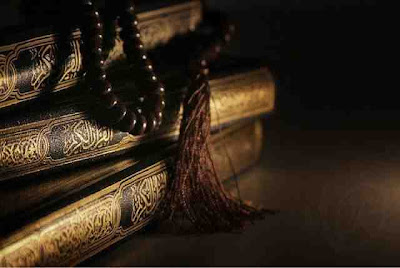Platina.-
The best richness, is the richness of the soul.
Believing in Bad omens
As-Salaamou 'Alaykoum warahmatoe-' Allaahie wabarakatoeh dear sisters, dear brothers ..
In-shaae-'Allah you be in good health and Imaan.
This article is (sadly) among many Muslims have of recognition.
May Allaah protect us! Ameen!

Linguistic meaning: at-Tayrah comes from the word at-Tayr that means bird. It means that you draw good and bad omens from certain events.
The meaning given by the scholars: pulling a bad omen of something you have seen, heard, or have come to know.

The judgment about believing in bad omens
Believing in bad omens is based on the following two issues in violation of Tawheed:
One person who believes in bad omens has given his trust in Allah, and this then put him in another.
2 He clings to a case that is not true, but only an illusion and imagination.
The evidence for the prohibition of believing in bad omens
The following Statement of Allah (interpretation of the meaning):
"You know, their fate is only with Allah, but most of them do not know it." (Surat al-A'raaf: 131)
Also said the Prophet (peace be upon him): "(Belief in) bad omens is shirk." (Abu Dawood and at-Tirmidhi)

The condition of one who believes in bad signs
Whoever believes in bad signs fall into one of two categories:
1 He abandons what he wanted to do and can be convinced by this bad omen. This is one of the main form of believe in the so-called good and bad omens.
2 He makes the bad omen for what it is but he is worried, gets harassed and worried and afraid of the negative consequences of the bad omen that occurred. This also belongs to the believe in bad omens, but here there is a milder form than the condition mentioned above.
Both conditions cause the Tawheed of the servant damage.

The medicine for those who believe in bad omens
That he the following supplication, which was narrated by Abu Dawood, denounces:
"Allahumma laa ya'tiya buttock Hasanaati illaa Anta. Wa laa yadfa'us-Sayyi'aati illaa Anta. Wa wa laa laa hawla Qoewwata illaa bik. "
(O Allah, no one comes to the good, except U. And no wards off evil, except U. And there is not a force no outside power U.)
And the following supplication, which was narrated by Ahmad and declared authentic by Shaykh al-Albani:
"Allahumma laa Tayra illaa Tayroek. Wa laa Khayra illaaKhayroek. Wa laa ilaaha ghayroek. "
(O Allah, You alone is about fate. And only thine is all good comes. And there is no god but You)
: He should
- Know the danger of believing in bad omens;
- To fight his own Nafs;
- To believe in the fore of Allah;
- Allah to give the benefit of the doubt;
- Make the du'aa 'ul-Istikhaarah Use.

When Tayrah banned?
The Prophet says: "It is only when you Tayrah on this basis takes the decision whether or not to go." (Ahmad)
Good omens
Meaning: Fa'al means a good word that one hears so he is glad, for example, a person who wishes to go on a trip and hear someone say, "That you may rejoice."
The verdict on this: this is allowed. The proof is the following statement by the Prophet: "I love the good omen." (Al-Bukhari and Muslim)

The difference between good and bad omens
At-Tayrah: means that you think bad about Allah, that you assign any of his rights to another and you connect your heart to a creature that can not harm nor can benefit you.
Al-Fa'al: you have confidence in Allah and that you let anything stop him. [1]
[1] Fath ul-Madjied, p 278. Al-Qawl ul-Mufeed of Sheikh Ibn ul-'Uthaymeen, part 1, p 559.Al-Axis ilatoe shore Adjwibatoe fil-' Aqeedah of Saalih al-Atram, p 65. At-Tayrah Mohammad al-Hamd.
Source: www.al-yaqeen.nl
Alaykoum ou wa sallam,
As-Salaamou 'Alaykoum warahmatoe-' Allaahie wabarakatoeh dear sisters, dear brothers ..
In-shaae-'Allah you be in good health and Imaan.
This article is (sadly) among many Muslims have of recognition.
May Allaah protect us! Ameen!

Linguistic meaning: at-Tayrah comes from the word at-Tayr that means bird. It means that you draw good and bad omens from certain events.
The meaning given by the scholars: pulling a bad omen of something you have seen, heard, or have come to know.

The judgment about believing in bad omens
Believing in bad omens is based on the following two issues in violation of Tawheed:
One person who believes in bad omens has given his trust in Allah, and this then put him in another.
2 He clings to a case that is not true, but only an illusion and imagination.
The evidence for the prohibition of believing in bad omens
The following Statement of Allah (interpretation of the meaning):
"You know, their fate is only with Allah, but most of them do not know it." (Surat al-A'raaf: 131)
Also said the Prophet (peace be upon him): "(Belief in) bad omens is shirk." (Abu Dawood and at-Tirmidhi)

The condition of one who believes in bad signs
Whoever believes in bad signs fall into one of two categories:
1 He abandons what he wanted to do and can be convinced by this bad omen. This is one of the main form of believe in the so-called good and bad omens.
2 He makes the bad omen for what it is but he is worried, gets harassed and worried and afraid of the negative consequences of the bad omen that occurred. This also belongs to the believe in bad omens, but here there is a milder form than the condition mentioned above.
Both conditions cause the Tawheed of the servant damage.

The medicine for those who believe in bad omens
That he the following supplication, which was narrated by Abu Dawood, denounces:
"Allahumma laa ya'tiya buttock Hasanaati illaa Anta. Wa laa yadfa'us-Sayyi'aati illaa Anta. Wa wa laa laa hawla Qoewwata illaa bik. "
(O Allah, no one comes to the good, except U. And no wards off evil, except U. And there is not a force no outside power U.)
And the following supplication, which was narrated by Ahmad and declared authentic by Shaykh al-Albani:
"Allahumma laa Tayra illaa Tayroek. Wa laa Khayra illaaKhayroek. Wa laa ilaaha ghayroek. "
(O Allah, You alone is about fate. And only thine is all good comes. And there is no god but You)
: He should
- Know the danger of believing in bad omens;
- To fight his own Nafs;
- To believe in the fore of Allah;
- Allah to give the benefit of the doubt;
- Make the du'aa 'ul-Istikhaarah Use.

When Tayrah banned?
The Prophet says: "It is only when you Tayrah on this basis takes the decision whether or not to go." (Ahmad)
Good omens
Meaning: Fa'al means a good word that one hears so he is glad, for example, a person who wishes to go on a trip and hear someone say, "That you may rejoice."
The verdict on this: this is allowed. The proof is the following statement by the Prophet: "I love the good omen." (Al-Bukhari and Muslim)

The difference between good and bad omens
At-Tayrah: means that you think bad about Allah, that you assign any of his rights to another and you connect your heart to a creature that can not harm nor can benefit you.
Al-Fa'al: you have confidence in Allah and that you let anything stop him. [1]
[1] Fath ul-Madjied, p 278. Al-Qawl ul-Mufeed of Sheikh Ibn ul-'Uthaymeen, part 1, p 559.Al-Axis ilatoe shore Adjwibatoe fil-' Aqeedah of Saalih al-Atram, p 65. At-Tayrah Mohammad al-Hamd.
Source: www.al-yaqeen.nl
Alaykoum ou wa sallam,
